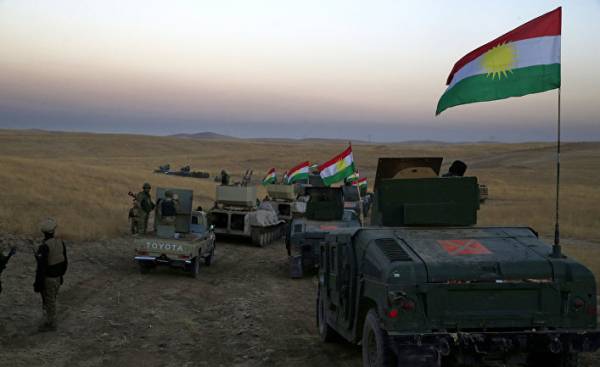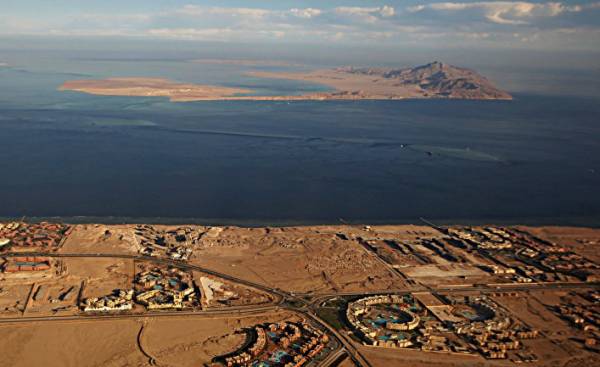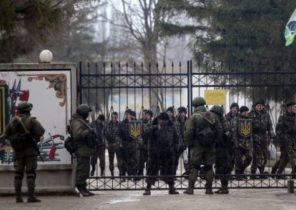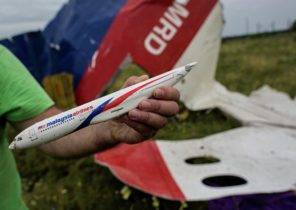
June 14, the American news Agency CNN has published a short message that for the first time since the beginning of the Syrian crisis, the us military carried out a diversion launchers HIMARS missile system from Jordan on the Syrian territory. News report needs no comments or clarifications. Three times in a week Washington was struck at the convoys of the Syrian army at a time when they were moving in the direction of At-Tanvi. The irony is that, according to information released by the US military, this measure was taken in self-defence, as if the Syrian army advanced in the direction of Chicago, not the village of At-Tanta. In fact, Washington wants to change the new balance of forces in connection with the progress of the Syrian army to the Syrian-Iraqi border, which was announced on the 10th of this month.
As for the success of the Syrian army, the achievement of the district At-Tanvi is a very important step. However, much more important for her to finally gain a foothold in this territory, which in turn will give the army some serious advantages. In fact, the promotion of Syrian government forces is the inevitable failure of American policy towards this country, which in turn can produce a Domino effect in the middle East. All this has not escaped from attention of the Russian side, as evidenced by the statement of the official representative the Ministry of foreign Affairs of Russia Maria Zakharova, made on June 11. So, according to her, the international coalition headed by the United States, suffered a series of setbacks in Syria.
The latest from the At #Tanf Garrison in southern #Syria: U.S. SOF training Siege Maghawir al-Thawra rebels. pic.twitter.com/bVS6iZbVt0
— Nicholas A. Glavin (@nickglavin) June 22, 2017
The decision of the American military to deliver HIMARS missile systems on Syrian territory speaks to the fact that Washington does not want to put up with the current state of things and ready to make all necessary efforts to change it. Meanwhile, it portends a serious escalation of the conflict in the East of Syria. At the same time, perhaps such a measure by the USA is natural if to take into account the number of players whose armed forces are present in this area. In addition to the U.S. among them there are Russian, Iranian, Turkish, Saudi, Qatari, Jordanian, British and French military, which allows us to assert that this region has the highest “density” of the international presence, which currently nowhere else in the world. Perhaps, in modern history, even during the capture of Berlin in may 1945 was not present that kind of power.
At the same time there is one factor that complicates the situation in the East of Syria is the role of Syrian Kurds in the conflict. So, Syrian Kurds can see in the current environment the best opportunity to make progress or any benefit relatively more independence from the Central authorities. Steps in this direction were taken by the Syrian Kurds in November 2013 (the transitional government) and March 2016 (the creation of the Federal region Rozhava and Northern Syria), so the next step would be autonomy with enhanced powers. In the past they focus on the model of Iraqi Kurdistan, which “came to light” in the midst of the military operation “desert Storm” in 1991. Then after the United States ‘ invasion of Iraq and the fall of its capital Baghdad in April 2003, Iraqi Kurdistan has received more independence from the Federal government.
There is no doubt that the Syrian Kurds are on the path to their Iraqi brothers, who operate according to the concept proposed by former U.S. Secretary of state Henry Kissinger. This concept involves step by step actions to achieve the goal. And recently, on June 12 Iraqis in Erbil announced that 5 September is the day of the referendum on the fate of Iraqi Kurdistan, despite the fact that the United Nations chose to distance himself from an upcoming event, stating that it would not participate in it and will not act as an observer.
The problem is that the Kurdish leaders, the decision-maker, apparently, overlooked several important factors, which are decisive for a successful transition to a higher degree of self-government. The most they can do is to repeat the Iraqi experience, in spite of the huge gap that separates the Syrian Kurds from the gains of their Iraqi brethren. So, for example, in Iraqi Kurdistan is home to four and a half million Kurds, among which the lives of half a million of different minorities, while the population Rozhava is about six million people, of which two and a half million Kurds, and the rest of the population — the Arabs and Turkmen, Assyrian and Yezidi minorities. On the other hand, you need to understand that the conditions in which they must act the Kurds of Syria, differ sharply from conditions in which the Iraqi Kurds were able to obtain greater independence (wars in 1991 and 2003). As a result, Syrian Kurds can bet on the Americans, the eloquent promises with which combines some activity with them that suggests that their support is not unfounded. Or they will have to rely on the support of some regional players, however, most likely it will be limited to rhetoric, especially if we take into account the crisis in the Persian Gulf.
 © AP Photo, Bram Apply armored vehicles of the Kurdish Peshmerga, 30 km from Mosul, Iraq. 17 Oct 2016
© AP Photo, Bram Apply armored vehicles of the Kurdish Peshmerga, 30 km from Mosul, Iraq. 17 Oct 2016
In the decision of Americans can be seen as the fact that the Kurds as a whole prefer to remain allies of the US. Probably the reason is that the Americans ignored the demands of Turkey, which was categorically against the participation of Syrian Kurds in the battles for Raqqa. However, you need to understand that the position of Washington in this case is more tactical in nature. As a result, relying on it would be a serious strategic mistake, which can lead to large losses. Those who are closely following American politics, you know that Washington can make a lot of promises, and take on many commitments during the escalation of the conflict, realizing in the end some of them. However, when we’ll discuss the final terms of settlement of the conflict in the phase of its completion, the position of the United States may be radically different from all of what they said in the past. In the end, in the process of political decision-making is critical interests and specific circumstances that can change over time. In this context, the interests of the United States in relations with the Turks, Iranians or Iraqis are not commensurate to the interest in relation to the Kurds.
The middle East after the events of the “Arab spring” that began in 2011, has witnessed a major shift of the regional center of gravity. If earlier centers of major decisions in the Arab world were Damascus, Cairo, Baghdad and Algeria, today they were in Riyadh and Doha. The Gulf States were able to take advantage of the chaos, which plunged these countries. On top of that, they have used their financial resources, which played the role of “Trojan horse” to exert influence on the situation in these countries, which can be seen today. Perhaps in the beginning it was obvious that Saudi Arabia and Qatar have achieved great success in their attempts to destroy the Foundation of regional security and stability, however, it is clear that this success was temporary, because they were too easy. The fact that you cannot change the geographic reality and historical facts with money or propaganda.
Today the attempts of these countries to change reality be the subject of ridicule, because at present we can observe how the former “center of gravity”, in favor of which say geography and history, return lost influence. The attempt of Saudi Arabia to completely subjugate the Egyptian leadership with agreement on the Islands of Tiran and Sanafir, represents not that other, as attempt to find support in these centers, because they can help the Kingdom maintain its leadership in the region after the collapse of the balance of power in the Persian Gulf. Saudi Arabia sees, what are the neutrality Kuwait, Oman distance, which adheres to its own regional strategy, while other Gulf States like United Arab Emirates, as evidenced by Wikileaks, are going to distance themselves from the Kingdom. So, Saudi Arabia is still only one ally Bahrain, which is facing threats from which it will not protect neither the Saudi authorities nor American.
 © AFP 2016, StringerОстрова Tyrant and Sanafir in the Red sea
© AFP 2016, StringerОстрова Tyrant and Sanafir in the Red sea
The problem is that Saudi Arabia has adopted the concept and looks of the capitalist West, the sacred rule which has throughout its history, is that supposedly “money is the biggest source of power.” Yes, this is true, but this tool has its limits and may not always give the result. However, for decades, Riyadh came from the fact that the cash resources sufficient to create the necessary coalitions and using them to protect their interests. Saudi Arabia to such an extent in this, her policy became a cause for ridicule. It happened when Indonesia and the Maldives said that he heard from the media that joined the coalition, which Riyadh announced in 2015. Even as Saudi Arabia ensures its security, we can consider the naive expectation that the time Riyadh helps certain States, they have to sacrifice for it the most expensive. The same fundamental contradiction we see when we know what Saudi Arabia considers as the main threat to its existence and development. So, for example, the Saudi leadership believes that Iran is the only force that poses a threat to the Kingdom and all the Gulf States. Confronting Tehran, the Saudis are working to create a variety of unions, which are actually ineffective. In other words, Saudi Arabia is ready to pay Americans and dozens of countries, so that they in turn expressed their solidarity with the Kingdom and support its military sense. At the same time, perhaps the latter simply has no choice, because in order to well prepare Saudi army will need at least half a century. However, the Kingdom is trying to increase its material, economic and military resources to be able to force the enemy to change its policies or to moderate leadership ambitions. As you know, the weakness has been, historically, the biggest incentive for an active policy abroad.
To summarize, it should be said that Saudi Arabia over the past four decades, spent tens of billions on the creation of a material base with which it could influence what others think about her. However, today it becomes obvious that she acted in the wrong direction.







